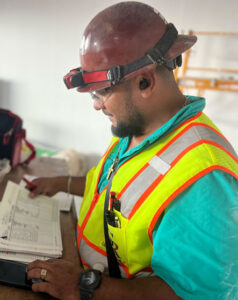The Essential Role of a Construction Foreman in Project Success
 The foreman’s role is crucial to the success of any construction project. They are the frontline supervisors who communicate, motivate and organize, which directly affects a project and its outcome. Their role is essential to the successful completion of the project at hand.
The foreman’s role is crucial to the success of any construction project. They are the frontline supervisors who communicate, motivate and organize, which directly affects a project and its outcome. Their role is essential to the successful completion of the project at hand.
Typically, the foreman is one of the more experienced professionals on the work crew. They have the daily responsibility of planning, preparing and implementing the work schedule for their team on the construction site. From the time the foreman arrives on site until the end of the shift, they coordinate and lead their team, providing direction for work that needs to be done.
Keep reading to learn more about the essential responsibilities and skills required of a construction foreman.
Safety, Health, and Environment
Safety is of the utmost importance for the foreman. They are responsible for the team’s compliance with safety, procedures and regulations. It’s their job to reduce the risk of accidents and injuries before they occur. On the construction site, they ensure that safety briefings are conducted. It’s up to them to maintain overall safe working conditions on a project.
Foremen conduct regular safety inspections of a job site to identify potential health and environmental hazards and help implement corrective measures. They must also ensure that all workers are properly trained in safety procedures and equipped with the necessary protective gear.
Foremen play a critical part in supporting and enforcing their team’s best safety practices. By recognizing potential problems in advance and having an emergency preparedness plan in place, a foreman helps crews work safer and ensures projects get completed on time without incident.
Leadership and Supervision
Leadership skills require more than understanding building codes and techniques. A foreman provides a clear vision for project goals. They inspire action and influence behavior, key components for meeting project deadlines. When necessary, they can make difficult decisions, solve problems on-site and mentor crew members.
Through strong interpersonal skills, they can inspire their crew, fostering a positive work environment that promotes productivity. In the leadership role, they assign duties to workers and resolve any conflicts or issues that might emerge among the team.
Communication
As a foreman, the role includes overseeing the project and coordinating details with the superintendent, as well as other foremen, the client and the field crew. Clear communication and active listening are integral to making sure craftsmen like carpenters, plumbers and electricians understand what they need to do to get the job done right. It is also critical to ensure progress is accurately reported to the client, construction superintendent or other stakeholders of the project.
As frontline supervisors, foremen have an important responsibility to encourage clear, concise and consistent communication with their teams and to implement a holistic approach to communication that can ultimately lead to better project outcomes.
Quality
It is the foreman’s job to assess the quality of their crew’s work. They are charged with evaluating the caliber of the work being done, ensuring it meets the quality and standards for local codes, and those of the project manager and superintendent.
Paying attention to details is vital. To adhere to quality standards, the foreman is expected to take stock of work quality by individual craft professionals as well as overall team performance. Defects in materials or errors in construction need to be identified and corrected before the project is impacted. The foreman should understand they are accountable for the work that’s being done and getting the best results.
Productivity
A foreman helps ensure their crews are productive on a day-to-day basis. Through daily planning, schedule management and problem-solving they work to keep the crew focused and on task. They are responsible for inspecting the work completed each day to ensure that it meets the specifications and standards set within the project plans.
Productivity can be enhanced, encouraged and influenced by providing continuous feedback. It can positively affect job satisfaction and work performance. Employees want to be recognized for their efforts and by providing feedback, they understand their work is not going unnoticed.
NCCER
Foreman training bridges a crucial gap for field leadership. It is estimated that nearly 70 percent of construction foremen lack training in crucial areas like communication and quality control. NCCER’s Construction Foreman Certification Program can help hone those skills for this essential position by providing training to better equip current and future foreman.
Participants in the NCCER program earn the foreman certification after passing a program-level assessment and demonstrating two or more years of verifiable, qualified field experience.
Getting the Job Done
Foremen are the leaders and point people on a project site, the main go-to person and a mentor for the construction crew. A good foreman prepares and understands what work needs to be done each day. And as leaders they understand the value and scope of their position. They are the essential supervisor role for making sure projects are built and finished as designed.
Interested in receiving more great construction news, research and content from NCCER? Click here to join our mailing list!


